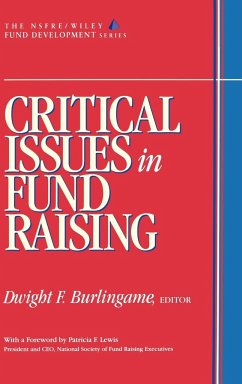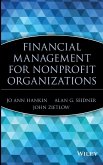Many forces--from demographics to politics to business trends--shape the nonprofit sector and the practice of fund-raising, but little attention has been given to the premises underlying many of the decisions fund-raisers make in their daily professional lives. This book examines the impact of different factors on this growing and changing field.
What can national organizations such as NSFRE do to assure that fund raisers are informed about public policies with which they must comply? Is it appropriate to require our members to take certain courses or pass certain tests in order to maintain their membership? Is there anything we can do to ensure that fund raisers who are not members of our association stay informed and act in compliance with relevant laws and regulations? Can the profession adequately regulate itself? Is licensing of fund raisers a good idea? If so, what group should be responsible for licensing--a governmental entity, a quasi-governmental entity, an elected or appointed body of practitioners?"...there is a very real need for comprehensive education and training programs that will help develop basic understandings and a common language with which fund raisers can communicate with each other--and with donors, policymakers, and the public. All who work as employees or volunteers in the not-for-profit sectorshould understand the rationale for the sector and have a basic knowledge of its history as well as current laws and regulations that effect the sector. There should be commonly known and accepted standards of ethical professional practice. And there should be a common understanding of the meaning of the terms that define our practice." --from the Foreword by Patricia F. Lewis President and CEO National Society of Fund Raising ExecutivesAs the nexus between the nonprofit community and the donors who support it, the fund-raising profession has a tremendous impact on how the nonprofit sector is perceived by the public and how it fares in an atmosphere of decreasing government support and increasing competition for donor dollars. But fund-raising professionals must cope with a growing list of important issues, including resource management, increased regulation at all levels of government, ethical scrutiny, donor diversity, and the establishment of professional standards. In the face of all these pressures, it is not surprising that little attention has been given to the premises that underlie many of the decisions fund raisers make in their daily professional lives.In Critical Issues in Fund Raising, highly respected practitioners and researchers address these issues and premises head-on. These contributors bring their vision, insight, study findings, and hard-won wisdom to bear in answering pivotal questions about the profession's future and revisiting some of its ongoing dilemmas. They examine hard data and reach well-founded, often surprising conclusions on controversial topics such as formula versus nonformula fund raising, fund-raising cost ratios as a measure of efficacy, and the perceived scarcity of minority donors. They explore myriad topics of both immediate and long-term concern to the profession, including: Fundamentals--donor motivation, demographics, innovative fund-raising strategies, and marketing versus public relations Advanced practices--cost effectiveness, regulation, law, and financial management Challenges in fundraising--ethics, diversity, and accountability International perspectives--fund raising in western Europe.Based on a Think Tank sponsored by the NSFRE in collaboration with the Counsel for the Advancement and Support of Education, the Association for Research on Nonprofit Organizations and Voluntary Action, and the Indiana University Center on Philanthropy, Critical Issues in Fund Raising offers up-to-date research on important issues, numerous ideas for improving and expanding fund-raising operations, and a generous portion of food for thought. It is must reading for fund-raising professionals, nonprofit executives, nonprofit board members and trustees, and fund-raising consultants.
Hinweis: Dieser Artikel kann nur an eine deutsche Lieferadresse ausgeliefert werden.
What can national organizations such as NSFRE do to assure that fund raisers are informed about public policies with which they must comply? Is it appropriate to require our members to take certain courses or pass certain tests in order to maintain their membership? Is there anything we can do to ensure that fund raisers who are not members of our association stay informed and act in compliance with relevant laws and regulations? Can the profession adequately regulate itself? Is licensing of fund raisers a good idea? If so, what group should be responsible for licensing--a governmental entity, a quasi-governmental entity, an elected or appointed body of practitioners?"...there is a very real need for comprehensive education and training programs that will help develop basic understandings and a common language with which fund raisers can communicate with each other--and with donors, policymakers, and the public. All who work as employees or volunteers in the not-for-profit sectorshould understand the rationale for the sector and have a basic knowledge of its history as well as current laws and regulations that effect the sector. There should be commonly known and accepted standards of ethical professional practice. And there should be a common understanding of the meaning of the terms that define our practice." --from the Foreword by Patricia F. Lewis President and CEO National Society of Fund Raising ExecutivesAs the nexus between the nonprofit community and the donors who support it, the fund-raising profession has a tremendous impact on how the nonprofit sector is perceived by the public and how it fares in an atmosphere of decreasing government support and increasing competition for donor dollars. But fund-raising professionals must cope with a growing list of important issues, including resource management, increased regulation at all levels of government, ethical scrutiny, donor diversity, and the establishment of professional standards. In the face of all these pressures, it is not surprising that little attention has been given to the premises that underlie many of the decisions fund raisers make in their daily professional lives.In Critical Issues in Fund Raising, highly respected practitioners and researchers address these issues and premises head-on. These contributors bring their vision, insight, study findings, and hard-won wisdom to bear in answering pivotal questions about the profession's future and revisiting some of its ongoing dilemmas. They examine hard data and reach well-founded, often surprising conclusions on controversial topics such as formula versus nonformula fund raising, fund-raising cost ratios as a measure of efficacy, and the perceived scarcity of minority donors. They explore myriad topics of both immediate and long-term concern to the profession, including: Fundamentals--donor motivation, demographics, innovative fund-raising strategies, and marketing versus public relations Advanced practices--cost effectiveness, regulation, law, and financial management Challenges in fundraising--ethics, diversity, and accountability International perspectives--fund raising in western Europe.Based on a Think Tank sponsored by the NSFRE in collaboration with the Counsel for the Advancement and Support of Education, the Association for Research on Nonprofit Organizations and Voluntary Action, and the Indiana University Center on Philanthropy, Critical Issues in Fund Raising offers up-to-date research on important issues, numerous ideas for improving and expanding fund-raising operations, and a generous portion of food for thought. It is must reading for fund-raising professionals, nonprofit executives, nonprofit board members and trustees, and fund-raising consultants.
Hinweis: Dieser Artikel kann nur an eine deutsche Lieferadresse ausgeliefert werden.








